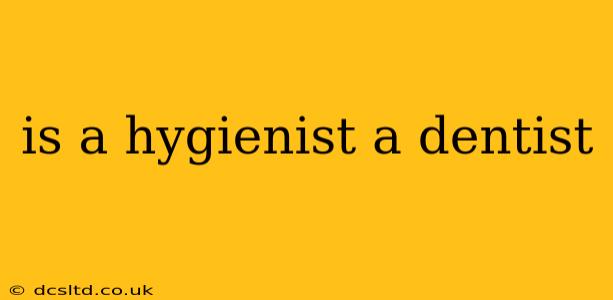Is a Hygienist a Dentist? Understanding the Roles in Dental Care
No, a dental hygienist is not a dentist. While both are crucial members of the dental healthcare team, they have distinct roles, training, and responsibilities. Understanding the difference is key to receiving the best possible oral care.
This article will clarify the roles of dentists and hygienists, addressing common questions surrounding their professions.
What does a dentist do?
Dentists are licensed medical professionals who diagnose, treat, and prevent diseases and conditions of the teeth, gums, and oral cavity. Their responsibilities include:
- Diagnosing oral diseases: Identifying cavities, gum disease (gingivitis and periodontitis), oral cancers, and other oral health problems.
- Performing complex procedures: Extractions, fillings, root canals, crowns, bridges, implants, and orthodontics (braces).
- Developing treatment plans: Creating personalized plans to address individual patient needs.
- Prescribing medication: Prescribing antibiotics, pain relievers, and other medications as necessary.
- Providing preventative care: Educating patients on proper oral hygiene and recommending preventative measures.
What does a dental hygienist do?
Dental hygienists are licensed healthcare professionals who work closely with dentists to provide preventative and therapeutic oral care. Their main focus is on maintaining oral health and preventing diseases. Their tasks include:
- Cleaning teeth: Removing plaque and tartar buildup to prevent cavities and gum disease.
- Providing oral health education: Instructing patients on proper brushing, flossing, and other oral hygiene practices.
- Taking x-rays: Assisting the dentist with diagnostic imaging.
- Applying fluoride treatments: Strengthening tooth enamel to prevent cavities.
- Performing periodontal charting: Measuring gum depth and assessing the health of gum tissue.
- Applying sealants: Protecting the chewing surfaces of teeth from decay.
What is the difference in education and training?
The key difference lies in their education and qualifications. Dentists complete extensive training, including several years of undergraduate study followed by four years of dental school. They must then pass rigorous licensing exams before they can practice. Dental hygienists, on the other hand, typically complete an associate's or bachelor's degree program in dental hygiene, followed by licensing examinations.
Can a dental hygienist perform procedures a dentist can?
No. Dental hygienists work under the supervision of a dentist and cannot independently diagnose or treat oral diseases. They are trained to perform preventative and therapeutic procedures, but not complex restorative or surgical procedures.
Can a hygienist diagnose and treat gum disease?
While hygienists play a vital role in identifying signs of gum disease (like bleeding gums or pockets), they cannot diagnose or treat it independently. They will document their findings and report them to the dentist, who will then make a diagnosis and create a treatment plan.
Do I need to see both a dentist and a hygienist?
Many dental practices integrate both roles, scheduling you with both a hygienist for cleaning and a dentist for check-ups and any needed treatment. Regular visits to a dentist and periodic cleaning appointments with a hygienist are essential for maintaining optimal oral health. The dentist provides overall care and supervision, while the hygienist focuses on preventative maintenance and early detection. Therefore, while you don't need to see them separately, their combined expertise offers the best approach to comprehensive oral health.
In conclusion, while both dentists and hygienists are vital for maintaining oral health, their roles, training, and responsibilities are distinct. Dentists provide comprehensive care, diagnosis, and treatment, while dental hygienists focus on prevention and maintenance. Understanding this difference is crucial for making informed decisions about your oral health.
